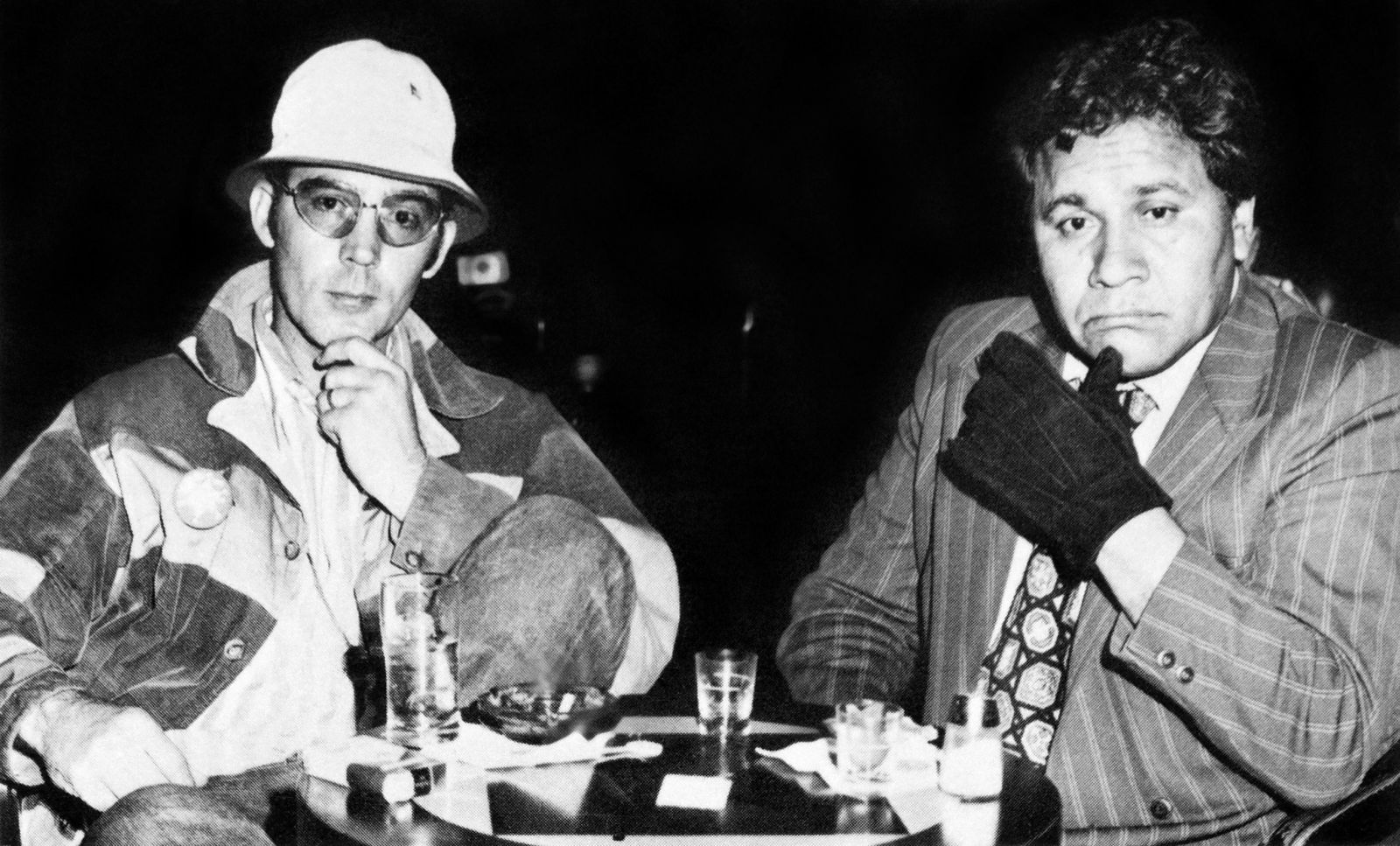Everyone Is Gonzo: The Hunter S. Thompson Musical

The only problem with this set is that it raises expectations that the play refuses to live up to.
On Tuesday, October 3, 2023, I was in San Diego and went to see the Hunter S. Thompson musical at the La Jolla Playhouse. I had no idea what to expect: greater musicals have been made on seemingly lesser musical-worthy material, but I’m also not really a fan of musicals. I’m a fan of specific musicals.
This turned out to be a great example of the kind I don’t like: the old-school, pre-Hammerstein musical where the music and the play are mostly separate. The show stops, songs are sung, the show restarts, without any help from the song. The songs could be sung at any point in this “musical”, and often by any of the characters.
The set, as you can see from the photograph, was amazing. While it didn’t all take place in Woody Creek, when the scene moved outside Woody Creek the lighting focused away the Woody Creek background.
The rest of the play was as if someone had read a matchbook biography of Thompson and decided, hey, I can write a musical about myself, and pretend it’s about Thompson, and that makes it gonzo!
Which is kind of true. On the one hand, it was the perfect Hunter S. Thompson musical: it gave Thompson the Thompson treatment, making him silly, ineffectual, and gay. Much as Thompson rewrote reality when covering his subjects, such as turning Ed Muskee into an exotic drug user the play turns Thompson into a prancing stereotype of a gay man.
The entire play was an over-the-top stereotype. It could have been dropped into any Parker & Stone musical as the bit that makes fun of modern musicals. It was almost literally Everyone Has Aids crossed with Hey, Mickey, let’s put on a play!. Everyone’s a freak. Everyone’s a WRITER—pronounced in all-caps. I have never heard anyone so clearly pronounce words in all caps. “I’m a WRITER.” “You’re a WRITER, Hunter.”
It’s a weird choice if you’re familiar with Thompson’s work. Thompson’s actual refrain, I’m a Doctor of Journalism or You’re dealing with a professional journalist! in the same tone as Bill Murray claiming to be a scientist in Ghostbusters, is worthy of caricature.

Perhaps most egregiously, the writers turn Oscar Zeta Acosta (right), author of The Revolt of the Cockroach People, into a whiny ineffectual loser.
But riffing off of those phrases would have veered dangerously close to making an important point about modern journalism’s antagonistic relationship with the truth and with their readers. So instead they went with Hunter S. Thompson as Judy Garland in an old studio system movie. “How can we defeat that evil man/war/America?” “Hey everyone, let’s put on a play write a newspaper column!”
Thompson made himself the hero of his stories. The writers of this musical made their own caricature of the writing and acting professions the hero…
…when they didn’t veer off into completely irrelevant headwaters. It wasn’t just the songs that broke from the story. There were also random monologues that hearkened back to pre-musical musicals. They even lampshaded the problem by telling the audience, the next three minutes has nothing to do with the story. They couldn’t even be arsed to connect their own modern prejudices to the prejudices of the era. Basic storytelling was beyond them.
Much of this was hampered by oddly self-defeating casting choices. How can you address racism in sixties journalism when Thompson’s own editor is a black female? That’s right: Jann Wenner was a black female. Wenner himself provided them the opportunity to address the inherent racism and sexism in journalism—and the entertainment industry generally. Wenner said that he hadn’t included blacks and women in his latest rock book because they aren’t articulate enough.
The press tried to downplay Wenner’s gaffe as an example of “saying the quiet part out loud” about rock history. But in fact, Wenner was saying the not-at-all-quiet part out loud about how journalism on the left and politicians on the left view successful minorities as subjects. Both Biden and Clinton showed the same prejudices when they gave Barack Obama the back-handed compliment of being surprisingly “articulate and clean”.
It’s the way leftist politicians think about blacks, and about women, and probably about all of us. It’s something well worth skewering, and Thompson would have gone in guns blazing—and did. Had it not been for their rewrite of history, the writers could have integrated Wenner’s gaffe into the play’s Wenner and made a serious statement about racism then and today. But because they rewrote diversity into Rolling Stone’s founding, that wasn’t possible. Instead the actress playing Wenner was reduced to an abject apology for having played the part (and presumably for still playing the part weeks later; by the time I saw the play, the gaffe was already old news).

Seriously, if you can’t turn this into a compelling play you should turn in your pen.
Thompson himself not only recognized this failure of thought leaders on the left, he attacked it viciously as a sort of white trash mentality.
Clinton is “white trash” who is “counting on people choosing him as the lesser of two evils.” Like the ‘Manchurian Candidate,’ he has no identity of his own except being on his presidential track since meeting JFK in the Rose Garden at age 14. — Hunter S. Thompson, paraphrase (Latrobe Bulletin, November 29, 1995)
Clinton is never mentioned in the play; the only successful presidential candidate mentioned in the musical is Nixon. Throughout the play, Richard Milhouse Nixon haunts the balcony and the auditorium as a sort of disinterested heckler. He’s the best part in the play, and they appear to have recognized it: they put the best actor in the role. Sadly, they also whiffed that relationship. The modern left cannot comprehend the respect that two sides in a debate can have for each other. Because of that, Thompson’s ride in the presidential limo to talk about football with Nixon is described as a disgrace, a failure. It was not two equals finding common ground amidst a vicious fight—imagine a Hunter Thompson and a head of state treating each other as equals in any other country but America—but a coward failing to call the devil to account.
The real Hunter Thompson forever after measured his enemies by how well they compared to Richard Nixon. They never did, especially not Clinton. That is a nugget for an effective and comedic musical.
- Goodreads review: Broadway Babies Say Goodnight: Jerry Stratton at Jerry@Goodreads
- This is an amazing overview of musicals, how they work, and how they’ve evolved.
- Hunter S. Thompson once spread a rumor of a presidential candidate’s drug addiction and it was taken seriously: M.Tomoski
- “Thompson claimed that Muskie was addicted to a hallucinogenic drug called ibogaine… HST colorfully described the effect of the drug on Muskie, ‘given the known effects of ibogaine… Muskie’s brain was almost paralyzed by hallucinations… he looked out at the crowd and saw gila monsters instead of people’.”
More Hunter S. Thompson
- A dark and bloody ground: Hunter S. Thompson
- Buy the Ticket, Take the Ride is new Hunter Thompson documentary that airs December 12. It’ll be coming out on DVD eventually but if you get Starz, I’d watch it.
- Hunter S. Thompson Dead
- Hunter Thompson dies, apparent suicide. One of the best authors of the twentieth century. “In my own country I am in a far-off land. I am strong but have no force or power. I win all yet remain a loser. At break of day I say goodnight. When I lie down I have a great fear of falling.”
- Better Than Sex
- “Confessions of a Political Junkie”. The world ain’t what it used to be, and before this thing is over, you’ll wish you weren’t either.
- Generation of Swine
- The “Tales of Shame and Degradation” are mostly the Bush-Dukakis presidential race (from the primaries to the bitter end) of 1988, not a good platform for gonzo journalism.
- Songs of the Doomed
- “Songs of the Doomed” covers the decline and fall of the Reagan Empire: the eighties. From the strange power politics meeting in Elko, Illinois thru the Pulitzer trial and the Berlin wall.
- Four more pages with the topic Hunter S. Thompson, and other related pages
